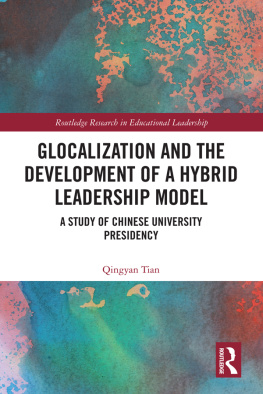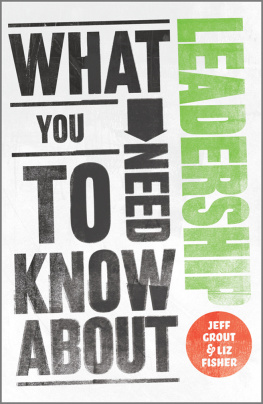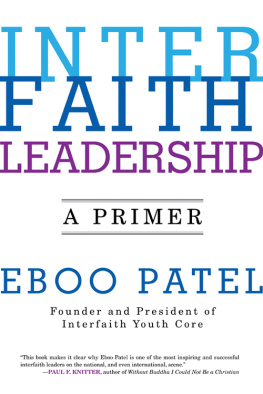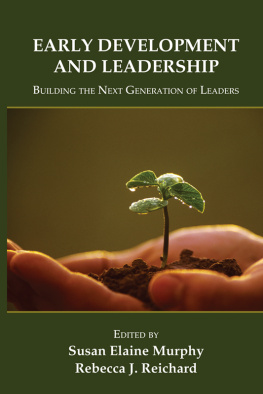


ACKNOWLEDGMENTS
I would like to thank several people who have been instrumental in the development of this book. Rozana Carducci, Melissa Contreras-McGavin, Tricia Bertram Gallant, and Jaime Lester have spent the last three years with me on the journey to explore leadership in new ways. Thank you to all the chapter authors who tirelessly made revisions in chapters that reflect novel ways of conceptualizing leadership. I also want to thank Laurel Beesemyer for her thoughtful comments, sense of humor, and editorial support. A special note to Helen (Lena) Astin for her intellectual leadership in this area and for inspiring me to work on rethinking leadership. Most of all, I want to extend my appreciation to Lynn Gangone who initiated my work in leadership development by asking me to help develop the Institute on Emerging Women Leaders and working with me as codirector for several years. She has worked with me in the trenches for over a decade to help transform the way people in higher education think about leadership development. Working collectively, in the spirit of empowerment, as full spiritual, emotional, and cognitive beings we can create experiences that truly transform people and change the nature of the world.
PREFACE
The quickest way of changing an institution is to
change its leadership.
James Perkins, former president
of Cornell University
One of the most important conditions for the health and future of higher education is the development of its leaders. Leaders create change and innovation or maintain important long-standing values. I am convinced that the future of higher education rests on creating a new set of leaders across campuses who embrace new concepts and abilities of leadership. One of the ways to ensure that higher education has the needed leadership pool is to create training programs. Since the 1960s programs have emerged at the national, regional, and institutional level to meet this need. In the late 1980s Sharon McDade published a well-received ASHE-ERIC monograph in which she created an inventory of leadership development programs in higher education, providing an overview of the various programs offered and the advantages of these programs. She explored the skills and knowledge required for leaders in higher education and the benefits of professional development programs. This monograph became a resource to help people identify leadership development programs as well as to understand how to create leadership development opportunities. Surprisingly, little has been written about faculty and administrative leadership development programs since the publication of this monograph (outside student leadership development programs). A void exists in the literature in higher education on the topic of faculty and staff leadership development.
While the field of higher education has languished in producing publications on leadership development programs, a plethora of new research has emerged about ways to develop leaders in other fields, such as business, public policy, community development, and politics, for example. In fact, in the past 20 years, there has been a revolution in the way that leadership is conceptualized and the way leaders are trained across most fields and disciplines. This revolution has moved beyond the doors of the academy, as evidenced by the fact that practitioner and professional journals, popular management texts, and leadership development programs now reflect revolutionary views of leadership that result in different skills and competencies needed among leaders.
What is the revolution that has transpired? Historically, leadership has usually been conceptualized as hierarchical in nature and emphasizing social control.1 However in the past 20 years, nonhierarchical, increasingly democratic forms of leadership that focus on process and values have been conceptualized. Moving away from hierarchical, authority-based, context-free, highly structured, and value-neutral leadership frameworks, contemporary scholars have embraced context-specific, globalized, and process-oriented perspectives of leadership that emphasize empowerment, cross-cultural understanding, collaboration, cognitive complexity, and social responsibility for others. The heroic, controlling, and distant leader of the past has given way to a focus on teams and collectives and social change. These many exciting changes in theory were summarized in Rethinking the L Word in Higher Education: The Revolution of Research on Leadership (Kezar, Carducci , & Contreras-McGavin, 2006) that described cultural, cognitive, chaos, and team theories of leadership driven by social constructivist and critical studies of the phenomenon.
The changes in leadership development reflect the changing context for leaders. In the 1960s and 1970s, traditional notions of authority were questioned and hierarchical and individualistic notions of leadership undermined. In the 1980s and 1990s, the world economy shifted creating a more interdependent system that has been called a globalized economy. The emphasis on interdependence reinforces the importance of collaboration and working in teams for enacting leadership. As people throughout the world connect and work together with greater frequency, cultural and social differences have become recognized and have been studied in relation to leadership. Various forms of technology have sped up decision time and connected people across the globe, making more local forms of leadership possible and the emphasis on context and culture more important (Lipman-Blumen, 1996). This has led to the democratization of leadership as well as making the process more complex and diffuse. While we do not summarize all the forces and conditions here, we recognize that the world in which leadership is practiced has changed dramatically, and that leadership development and practice need to evolve as well (see Lipman-Blumen, 1996; Vaill, 1996; Wheatley, 1999 for more detailed descriptions of the forces and conditions).
1. Other images have emerged over time but were not the predominant view. Versions of servant leadership have come and gone based on religious leaders like Jesus Christ or Buddha. Human relations theories in the 1900s advocated for more democratic and participatory forms of leadership.
While much has been written about needed changes to traditional frameworks of leadership in higher education (Heifetz, 1994; LipmanBlumen, 1996), equal attention has not yet been paid to the way that leadership development programs should change in order to reflect the leadership revolution. Most of the leadership development programs in higher education reflect outdated perspectives and approaches to leadership development. The programs bring together hierarchical, positional leaders; focus on skill and trait development; and reinforce the importance of social control and persuasion, and teaching competencies that transcend context. These outdated approaches to leadership are discussed more in chapter 1.
In this volume we examine the implications of new theories and concepts about leadership and the ways these concepts can be integrated to develop new leadership development programs for higher education. We also present examples or models of leadership development programs that integrate these new concepts to provide guidance for redeveloping programs in higher education. We showcase the few higher education leadership development programs that have begun to integrate the new leadership concepts into their curriculum and approach. Higher education will be ill prepared for future challenges if leaders continue to be trained in outdated modes that no longer fit the complexities and challenges of our times.









